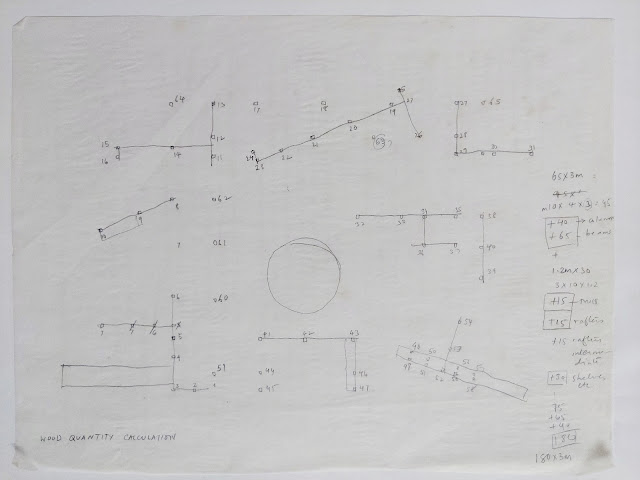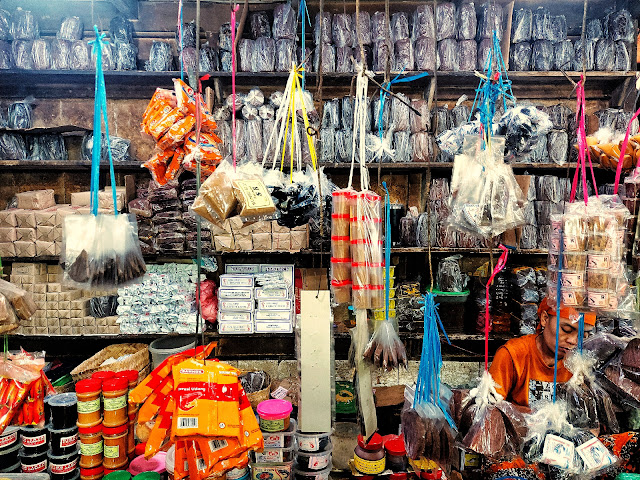On a warm July evening in the Oworonshoki suburb of Lagos, residents from the nearby slum neighbourhood gather around a rather worn-out community hall in the corner of a large open ground beside a massive community water tank built during the previous election, that lay dry for the last five years. Two young men walk past the onlookers, urging them to pick up discarded plastic bottles collected from the neighbourhood streets in large polypropylene sacks, for what will emerge into
a communal orchestra. The music beaten out through these empty bottles of purchased water along with other locally made instruments marked the opening of the Slumparty 2023 event. Originally started by Obiajulu Ozegbe or ‘Valu’ and his collaborators in 2019 as a way of mobilising the youth in the underprivileged areas of Lagos to alleviate the tension and violence within the community; Slumparty has morphed into an annual event that brings movement artists from across the world in their pursuit of redefining the perception of slums and overlooked sites in Lagos, through performance.
Slumparty became a serious affair soon after its first iteration when a performance of the local youth, who were otherwise turning to crime and divergent social activities due to inadequate access to infrastructure or issues of unemployment, compelled the local authorities to repair the street where they performed. Realising the potency of performance as a transformative tool, several performing artists, musicians, and visual artists gather annually thereafter to address socio-political and environmental issues through the festival, while training the youth in experimenting with contemporary forms of expression. In its edition for 2023, themed “Village of Dreamers”, artists from Tanzania, India, South Africa, New York, Cameroon, Ghana, and various parts of Nigeria were invited for a workshop to channelize latent insecurities into productive desires amongst the youth. This essay shall focus on one such performance conceptualised and executed during the event by the Ennovate Dance House the day after Slumparty’s inauguration.
Amongst the several collaborative and experimental acts lined up to take place on the street-turned-stage on the following day within the Oworo neighbourhood, the one that stood out was ‘
Afro Communal Offering’ that addressed various social, political and environmental concerns. In this performance, a beastly creature completely clad in colourful plastic bottles creeps up from around a garbage bin, invading the street-stage with its jubilant dance. Soon taking over the space, the creature exerts a ferocious yet seductive appeal, swinging and jumping to engulf the audience in its being. Alarmed by its unusual advances, a few young men enter the scene, beating the masqueraded beast with wooden sticks. As its plastic skin begins to splinter, the creature slows down, finding its way out of the site/sight. Subsequently,
a body covered in white emerges from the same garbage bin, and by demonstrating complex dis-entanglements, the body brings a certain calm to the otherwise volatile site.
Given the cultural context of Africa, the history of Lagos, and its contemporary challenges, ‘Afro Communal Offering’ is a particularly layered performance. In the Yoruba culture of Nigeria, masqueraded performances have long been a symbolic way to communicate a spirit’s message to the community through dance and other forms of expression. In a contemporary interpretation, the masquerade here is a costume constructed by stitching an abundance of empty and leftover plastic bottles into the colourful tentacles of the beastly body - simultaneously attractive and repulsive - much like the ghostly and inevitable presence of plastic in Nigeria’s everyday life today. The dance of the plastic beast on the street speaks to the spectacular presence of undesired waste suffocating the life of its people. Enveloping oneself thus, in plastic waste produced through the inevitable consumption of an everyday essential commodity like water, in itself makes a compelling political statement.
Water woes are historic for Nigeria. One recalls Nigerian musician and political activist Fela Kuti - the principal innovator of Afrobeat - singing Omi o l'ota o in Yoruba, which is loosely translated in Pidgin English as ‘Water No Get Enemy’. Fela is not only calling out the corrupt postcolonial regime’s apathy towards the struggle for water as a resource , but also suggesting how its provision would assure success for anyone who attended to it within the system. Fela’s lament, from 1975, fifteen years after Nigeria’s independence, holds relevance until today. In several of Nigeria’s neighbourhoods, including Oworonshoki, accessing everyday drinking water is still a struggle, as it often has to be purchased from departmental stores or local suppliers for the lack of functional water-supply lines. Water is traded and exchanged in plastic gallons and bottles replacing the need for the traditional earthen calabash in Nigerian households. Valu, the choreographer of the performance elaborates: “Whether we buy or the government supplies, it is general practice now to use plastics to store water, it’s part of the reason why some parts of Lagos are very dirty as plastics have blocked the drainage system.”
[1] The beating up of this masqueraded beast by young men of the community therefore gestures towards the beating out of not only the damaging aspects of plastic from the environment and Nigerian everyday life but also the bane of bottled water. In another view, it is a demand for sustainable supply of potable water that will prevent the dependence on petty plastics. The
white spirit emerging out of the garbage bin further references several local practices. The spirit is clouded in white powder which is rather significant for Nigerians. In Yoruba culture, when a person gives birth, the friends and family smear white powder on their face to celebrate and bring the new child into the world. Striking irregular poses, wrapped in a cloud thus, the other-worldly spirit speaks of both water and youth to lay tender ground for a healthy future. The appearance of the white spirit followed by the young men beating the plastic beast with a stick is also reminiscent of the Eyo festival celebrated by the Yoruba people. During this festival, the streets of Lagos are lined with performers clad entirely in white holding a palm stick, to ward off evil spirits and purify the city. In many ways, the act invites the youth to take up some purpose against these environmental evils that seem to be politically rooted.
Performed consciously and consistently on the dust-laden, yet-to-be-finished streets of one of the poorer neighbourhoods, Slumparty has brought significant change in the perception of Oworonshoki that was seen as a dark district in Lagos until 2019, into a place of celebration and political action. It is the condensation of multiple histories and futures through their embodiment in sound, space, materiality that (re)produces the everyday environment and social reality for public imagination. Dancing on the streets makes them safer, mobilising opportunities for the youth to express and assert their presence in the city. As new acts are performed, residents peep out of their rusted tin-roof houses, transforming the site into a theatre of possibilities. Professor of sociology and urbanism Abdoumaliq Simone, in his book For the City Yet to Come articulates: “Urban Africans have long made lives that have worked. There has been an astute capacity to use thickening fields of social relations, however disordered they may be, to make city life viable.”
[2] In this vein, ‘Afro Communal Offering’ thus entangles the body and the city, reincarnating traditional tropes of African culture into the proliferating toxicity of plastic that not only becomes the material to produce music and masquerades but also eventually turns into a dark metaphor for the state of transforming ecosystems, unequal access, and asymmetrical modernity in Lagos, Nigeria’s economic capital.
Inputs by Ennovate Dance House
All images and videos by the author.
[1] Valu, founder of Ennovate Dance House in a conversation with the author.
[2] Simone, AbdouMaliq. For the City Yet to Come: Changing African Life in Four Cities, New York, USA: Duke University Press, 2004.
https://doi.org/10.1515/9780822386247 















































